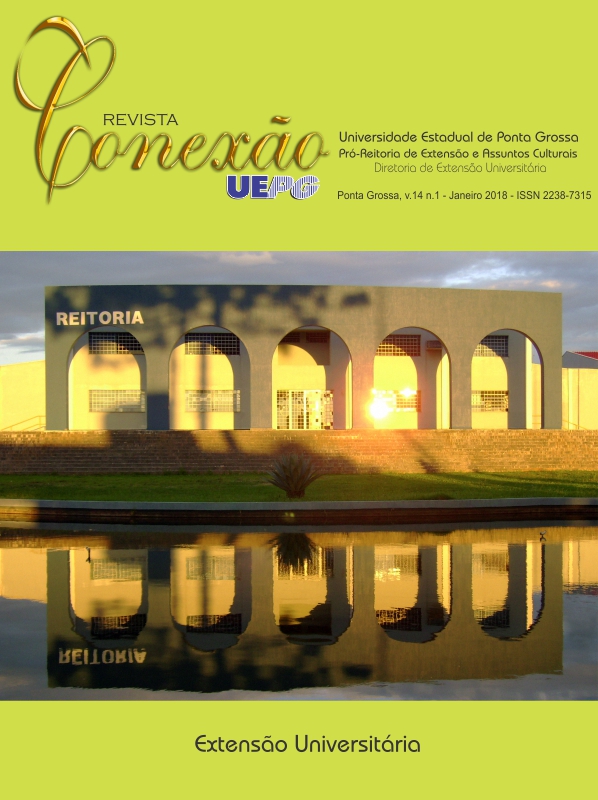UBUDEHE: JUVENTUDES, DIÁSPORAS E DIÁLOGOS INTERCULTURAIS EM MOVIMENTO
DOI:
https://doi.org/10.5212/Rev.Conexao.v.14.i1.0004Palavras-chave:
Ubudehe, JUBRA, interculturalidade, diásporas, UNILAB.Resumo
Os projetos de extensão Rede JUBRA e UBUDEHE, vinculados ao Programa Institucional de Bolsas de Extensão, Arte e Cultura (PIBEAC) / Pró-Reitoria de Extensão Arte e Cultura (PROEX) da Universidade da Integração Internacional da Lusofonia Afro-Brasileira (UNILAB) inserem-se na estratégia interinstitucional de pautar a questão das juventudes brasileira e na diáspora no Brasil, com ênfase na região do Maciço de Baturité/Ceará. O presente artigo objetiva relatar experiências dos projetos e analisar a contribuição da extensão universitária nos processos formativos de jovens. As pesquisas bibliográfica e documental constituem-se aportes metodológicos. Os projetos têm oportunizado diálogos interculturais, principalmente com juventudes indígenas e jovens internacionais na diáspora e jovens brasileiros do Maciço do Baturité ou em mobilidade na região. Conclusivamente, registra-se que a constituição de rede envolvendo múltiplos sujeitos, instituições e organizações sociais potencializa debates qualificados, circulação de ideias e produção de conhecimentos com pertinência social.
Downloads
Referências
ALEXANDRE, V. S.; FREIRE, J. C. S.; SILVA, A. A. R.; LOPES, A. M.; MARTINS, E. S. Interculturalidade na formação de professores: diálogos UNILAB e comunidades indígenas no Ceará. In: SEMANA UNIVERSITÁRIA DA UNILAB, III., 2016, Redenção. Anais... UNILAB, 2016. Disponível em: < http://semanauniversitaria.unilab.edu.br/anais-2016/>. Acesso em: 10 jun. 2017.
BERTALANFFY, L.V. Teoria Geral dos Sistemas. Rio de Janeiro: Vozes, 1990.
BRASIL. Lei nº 12.852. Institui o Estatuto da Juventude e dispõe sobre os direitos dos jovens, os princípios e diretrizes das políticas públicas de juventude e o Sistema Nacional de Juventude – SINAJUVE. Brasília: Casa Civil, 2013.
COUTO, M. Uma palavra de conselho e um conselho sem palavras. In: Pensatempos. 2. ed., Lisboa: Editorial Caminho, 2005, p. 45-49.
FÓRUM DE PRÓ-REITORES DE EXTENSÃO DAS INSTITUIÇÕES PÚBLICAS DE EDUCAÇÃO SUPERIOR BRASILEIRAS (FORPROEX). Política Nacional de Extensão Universitária. Porto Alegre, RS: Gráfica da UFRGS, 2012. (Coleção Extensão Universitária; v. 7).
FREIRE, P. Educação como Prática da Liberdade. Rio de Janeiro: Paz e Terra, 1989.
FREIRE, J. C. S. Juventude camponesa e políticas públicas: pertinência social do Programa Saberes da Terra na Amazônia paraense. 2009. Tese (doutorado) - Universidade Federal do Pará, Belém, 2009.
KLEIN, J. Interdisciplinarity: history, theory, and practice. Detroit: Wayne State University Press, 1990.
LIMA, T. C. S. de; MIOTO, R. C. T. Procedimentos metodológicos na construção do conhecimento científico: a pesquisa bibliográfica. Revista Katál., Florianópolis v. 10, n. esp., p. 37-45, 2007.
LOPES, C.; THEISOHN, T. Desenvolvimento para Céticos: Como melhorar o desenvolvimento de capacidades. São Paulo: Editora Unesp, 2006.
MAY, T. Pesquisa social: questões, métodos e processo. Porto Alegre: Artmed, 2004.
MORIN, E. O método V: a humanidade da humanidade. Porto Alegre: Sulina, 2002.
PAIS, J.M. Ganchos, tachos e biscates: jovens, trabalho e futuro. Lisboa: Âmbar, 2003.
ROMÃO, J. E.; CABRAL, I. E.; CARRÃO, E. V. M.; COELHO, E. P. Círculo epistemológico: círculo de cultura como metodologia de pesquisa. Revista Educação e Linguagem, São Bernardo do Campo: UMESP, v. 9, n. 13, p. 173-195, jan./jun. 2006.
SANTOS, B.S. A construção intercultural da igualdade e da diferença. In: SANTOS, B.S. A gramática do tempo. São Paulo: Cortez, 2006. p. 279-316.
______. A Universidade no século XXI: para uma reforma democrática e emancipatória da Universidade. São Paulo: Cortez, 2004.
______. Para uma sociologia das ausências e uma sociologia das emergências. Revista Crítica de Ciências Sociais, n. 63, p. 237-280, out. 2002.
SARAIVA, J. F. S. A África no século XXI: um ensaio acadêmico. Brasília: FUNAG, 2015.
UNILAB. Resolução nº08/2017. Aprova o Regimento Geral da Universidade da Integração Internacional da Lusofonia Afro-Brasileira (Unilab). Redenção: CONSUNI, 2017.
______. Resolução nº42/2016. Aprova o novo Estatuto da Universidade da Integração Internacional da Lusofonia Afro-Brasileira (Unilab). Redenção: CONSUNI, 2016.
WALSH, C. Pedagogías decoloniales: prácticas insurgentes de resistir, (re)existir y (re)vivir. Quito: Abya Yala, 2013.
______ . Interculturalidad y (de)colonialidad: Perspectivas críticas y políticas. Revista Visão Global, Joaçaba, SC, v. 15, n. 1-2, p. 61-74, jan./dez. 2012.
Downloads
Publicado
Edição
Seção
Licença
a) Os autores mantêm os direitos autorais e concedem à revista o direito de primeira publicação, com o trabalho simultaneamente licenciado sob a Creative Commons Attribution License que permite o compartilhamento do trabalho com reconhecimento da sua autoria e publicação inicial nesta revista.
b) Ao submeter um artigo à Revista Conexão UEPG e tê-lo aprovado os autores concordam em ceder, sem remuneração, os seguintes direitos à Revista: os direitos de primeira publicação e a permissão para que a Revista redistribua esse artigo e seus metadados aos serviços de indexação e referência que seus editores julguem apropriados.
c) Os leitores são livres para transferir, imprimir e utilizar os artigos publicados na Revista, desde que haja sempre menção explícita ao(s) autor (es) e à Revista Conexão UEPG e que não haja qualquer alteração no trabalho original. Qualquer outro uso dos textos precisa ser aprovado pelo(s) autor (es) e pela Revista.

Este obra está licenciado com uma Licença Creative Commons Atribuição 4.0 Internacional.





